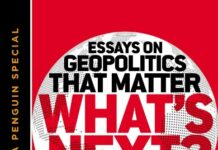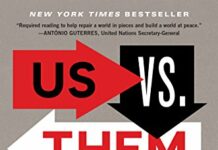
Ebook Info
- Published: 2016
- Number of pages: 256 pages
- Format: PDF
- File Size: 1.01 MB
- Authors: Ian Bremmer
Description
Bestselling author and strategist Ian Bremmer argues that Washington’s directionless foreign policy has become expensive and dangerous. Since the end of the Cold War, the U.S. has stumbled from crisis to crisis in Afghanistan, Iraq, Iran, Libya, Syria, and Ukraine with no clear strategy. Bremmer urges us to think more deeply about what sort of role America should play and how it should use its superpower status. He explores three competing options: • Independent America: America should no longer take responsibility for solving other people’s problems, and instead should lead by example. • Moneyball America: Washington can’t meet every international challenge, but we can and should focus on opportunities and defend U.S. interests where they’re threatened. • Indispensable America: Only America can defend the values on which global stability increasingly depends. We will never live in a stable world while others are denied their most basic freedoms. There are sound arguments for and against each of these choices, but we must choose. Washington can no longer improvise a foreign policy without a lasting commitment to a coherent strategy.
User’s Reviews
Editorial Reviews: Review “This brilliant and provocative book is required reading for every presidential candidate in 2016—and everyone who will cast a vote.” —Nouriel Roubini, chairman of Roubini Global Economics“Bremmer deals with America’s role in a world in transition with honesty and sincerity. This is a valuable contribution to an important debate from an experienced and insightful leader.”—Jeffrey R. Immelt, chairman and CEO of GE“Superpower is an insightful and original piece of work—drawing on Bremmer’s remarkable understanding of politics, America, and the world. This is a must read for all those concerned with the twenty-first-century geopolitical landscape.” —Christine Lagarde, managing director of the International Monetary Fund“This book provides a clear and incisive way to think about America’s role in the world. Should it focus on its interests, its values, or its domestic needs? Bremmer offers his own opinions, but more important, he will help you sharpen your own.” —Walter Isaacson, president and CEO of the Aspen Institute; bestselling author of Steve Jobs and The Innovators”Superpower is a creatively organized and critically important book: Bremmer challenges Americans to hvae a difficult but increasingly inescapable conversation about the role they wish their country to play in world affairs, and he objectively gives them the facts and considerations they need to do so intelligently.”—The Times Literary Supplement About the Author IAN BREMMER is the president and founder of Eurasia Group, the leading global political risk research and consulting firm. He has published nine books, including the national bestsellers The End of the Free Market and Every Nation for Itself. He lectures widely and writes a weekly foreign affairs column for Time magazine, where he’s editor at large. He lives in New York City. Excerpt. © Reprinted by permission. All rights reserved. “I promise to tell you exactly what I believe and why I believe it. But this book is about what you think. Whether you’re an American or the proud citizen of another country, I want to know what role you believe the only superpower should play in our world. If you finish this book with a strong opinion, especially if it’s a bit different from the one you have at this moment, and even if it’s the opposite of mine, this book will have served its purpose.” Read more
Reviews from Amazon users which were colected at the time this book was published on the website:
⭐Foreign-policy decisions look to be among the most daunting issues that Americans face in the next presidential election. How convenient that we have a book delivered now by Ian Bremmer that is written for us, the electorate of the United States. This fast-paced book is the ultimate self-help primer for the bewildered to assist in formulating opinions as to the desired direction for US foreign-policy in the next presidential election and beyond.Bremmer cogently presents three alternative foreign policy directions, none of which alone is necessarily the right one or any of which is mutually exclusive of the others. His point is that whatever the foreign policy of the next president, it needs to be formulated and communicated to give Americans, our allies, and even our enemies a better understanding of our direction. What is so refreshing about this book is that its intent is to engage the reader in a nonpartisan way to make his or her own choices about where America needs to position itself in this dangerous world.I agree with Bremmer that taking no position in the world and remaining purely reactive is probably worse than having some form of articulated strategy regardless of whether or not one agrees with it. Our strength, both at home and abroad, depends greatly upon the ability of our president to take firm, consistent, and principled positions on global events. Although foreign policy must remain flexible, sound strategy may help anticipate what direction makes sense as events unfold in the future.Bremmer frames issues in terms of modern conflicts, with numerous references to the most challenging past global conflicts that intertwined with our own history. But what might be right for the world today is not necessarily right for the world tomorrow, and Bremmer is therefore on target in keeping his arguments largely focused on current global issues.There are academics who may scoff at this book as being oversimplified and lightweight. That matters not. Americans are well served by having an accessible source on which to rely in formulating their views on what to expect from their president in terms of engaging in the world beyond our borders. It is generally not dense, jargon-laden tomes written by foreign-policy wonks that will be helpful to us. Of course, books such as “Superpower” are no substitute for keeping informed on a daily basis of world events. But Bremmer’s book can enhance our ability to make some sense of it all.By the time I finished Bremmer’s book, I was ready to take his quiz again and start focusing on my own foreign policy position with a better context in which to formulate my opinions. I assume others will have a similar experience after reading this book. And therein lies the reason I place Bremmer’s “Superpower” it in the rubric of successful self-help books.
⭐I’m really bad about giving reviews, but this book demands one. If this at all interests you, here’s why I think you should read it.1. It is very well written and easy to understand. I’m a slow reader and couldn’t put the book down. Finished it over the weekend.2. You will become better informed and educated about US foreign policy.3. This book makes you “think” – it doesn’t give you an answer or solution but a ton of questions. As a mentor told me once – learn the ask the right questions and the right solution just comes naturally.Despite my high recommendation, I do have some disagreements or observations on the book.1. The author presents foreign policy as a simple multiple choice of A, B, or C. While simple choices aids understanding, I think the author knows he has simply picked the two extremes and the midpoint of a continuum.2. The author indicates we “must chose” between these multiple choices. The truth is we (the American public) does chose via elections. Everyone knows Obama would pull back from the aggressive nation building from the previous administration. The American public will chose again in 2016 with candidates on the extreme of exceptionalist (Lindsey Graham) to more isolation (Rand Paul -depending on the day). And while I would like a long-term strategy, the American public can be fickeled as evidenced by past elections.3. I disagree that America has to broadcast to our allies and enemies which foreign policy choice we will make. Many of our allies and enemies surprise us with how they react; so why do we have to broadcast our strategy. I understand we sometimes should better articulate our strategy, but there are many challenges in doing so. In fact, if America all of a sudden broadcast the strategy chosen by the author, I think the world would be in chaos all at once. We don’t simply go from one extreme to the other without global consequences.Despite these minor disagreements, the book was great. I highly recommend it.
⭐This is a book that lays out the arguments for three different paths for American foreign policy. The author asks that you consider the arguments for each and decide for yourself which is the best path. He gives his choice and reasoning in the conclusion. It is well written and easy to understand but it helps if you have an interest in foreign affairs—a good book for a political science class and a must-read for any politician, and I must say, Rand Paul could have written the conclusion.I went in with my own ideas on the best foreign policy for America and after reading this book my ideas have been reinforced. I choose “Independent America” but I found that the Author’s arguments in favor of this path were not completely in line with mine. He uses some of the tired and worn progressive arguments of using cuts in defense spending for more government spending in other areas (such as education, which has proven to be totally ineffective) and a protectionist policy on trade, with a digression into some specious arguments about NAFTA. He does however reconcile this anti-trade argument to some degree in the conclusion. To his credit, he mentions the idea of cutting taxes with the money saved in defense cuts. (Imagine that—the American people would actually get to keep more of what they earn? What a radical concept!).I think this book is really a seminal piece of work on the subject. I would highly recommend it especially if you plan on voting in the next national election or if you have any interest at all in foreign policy.
⭐Foreign policy without strategy is ‘stupid stuff’. Excellent and informed overview of choices facing next US president. Is ambiguity a strategy? Democratic imperialism certainly isn’t any longer. Since 1945, the US has messed up every time it’s gone abroad. Values are important, but justice is built on order. And values are diverse. Keep yourself to yourself, stay open for business and those who admire you will strive to imitate.
⭐Currently writing my personal statement for international relations and this book was really helpful in providing me with relevant points on international superpowers.
⭐The purpose of the book is to convince the reader that he or she should vote for a presidential candidate with a foreign policy recommended in the book referred to as “Independent America”. The author describes his policy on page 26 as “An ambitious foreign policy designed to put “AMERICA FIRST.” This policy would avoid disasters like Vietnam, Iraq and Afghanistan. The huge amount saved (in the Future) would lead to a reduction in defense expenditure, investment in education and infrastructure; reduce the national debt and lower taxes. The “Independent America” policy is presented as the only sensible policy. There Is No other Alternative – TINA.This idea of America First is not new. It was also a vey popular movement in 1940 with 800.000 members in 450 chapters. Its basic policies included: “American principles can be preserved only by keeping out of the European war” and “Aid short of war” weakens national defense and threatens to involve America un war abroad.” The objective was to prevent the government from selling arms to the UK to defend itself against Germany. The group also put pressure on the US government to end its boycott on selling aircraft fuel to Japan to avoid getting involved in a war with Japan.This policy was not accepted by the government, which proves that there are alternatives.The two alternatives presented and rejected in the book are the Moneyball America foreign policy “designed to maximize the return on investment of the taxpayer’s investment” and “Indispensible America” referring to Presidents that without regarding risks or costs act as if they are the leaders of the world and impose American values on all other countries. The author uses a complicated system similar to an attitude or market survey with ten questions, where the reader is asked to choose between three questions. It is complicated as the author at the same time presents a policy and tries to prove that the two alternative policies are wrong at the same time, before and after.The author also assumes that a foreign policy can be defined with the answer to ten questions, and that by obtaining reader participation can arrive at the tight conclusion. This is however not a real survey. It is to convince the reader that “Independent America” is TINA.The author explains in great deal the many dangers America faces, proving that America is dependent on foreign policy and that there is no possibility of an “Independent America”, weakening his case.The authors presents a huge amount of criticism on the foreign policies of George H.W. Bush, Bill Clinton, George W. Bush and Barack Obama, some of it justified. Be aware that it is based on hindsight. However it is very difficult to find out what the author proposes. His recommendation on what should be done starts on page 165 with the question “if it is wise to create a strategy designed to keep adversities guessing “? On page 168 is the answer: “Here’s why that approach won’t work on twenty pages. His recommendation is that the President should inform the voters what his foreign policy will be over the next decades specifying the red lines.It may be useful to examine what happened to a similar policy prepared proposed by “America First.”The president rejected it. The President and General Marshall concluded that war had become inevitable and that America could only win the war with the full support of the American people and that declaring the war unilaterally would lead to continuous obstruction in Congress by the “America First” supporters. They knew that Japan had at that time had twice the number of aircraft carriers compared to America and needed time to strengthen military capabilities They therefore waited until America was attacked.The author presents scenarios. What would be possible scenarios if the President had followed “America First” foreign policy? It is possible even likely that Germany would have built the atom bomb before the USA. The President might in 1945 have been in the same position as the Japanese emperor in September 1945. It is almost certain that a German and Japanese empires would have emerged that would have controlled the Pacific and the Atlantic with control over transportation and trade.Did the President give absolute unconditional support to the UK? Definitely not. He would not have given any support if Lord Chamberlain had remained Prime Minister of the UK. He only provided support when Winston Churchill became Prime Minister.A major flaw in the recommendations of the author is that successful foreign policy depends on evaluation and understanding the leaders of the allies and of the opponents. Another example, Ronald Reagan decided he could reach an agreement with Gorbachev strongly opposed by many other leading Americans. Leaders change as leaders and are replaced by others. Foreign Policy has to be dynamic and constantly updated. From the point of view of an outsider it will therefore appear incoherent, By the way in military conflict the opponent should be unable to find out where and when attacked which also requires presenting incoherent information.A second serious weakness of demanding that the President should declare what America would do if Estonia would be attacked by Russia. This would mean stating whether or not America would if necessary use nuclear weapons. Just imagine the consequences of producing such a list for “approval” by the American citizens and regardless of who the leaders would be over time in other countries.Publishing these commitments would also have the effect that the red line protected countries would continue to decrease the defense expenditure, the opposite of what the authors thinks is necessary with which I agree. In this regard Singapore is an example to follow. The Prime Minister of Singapore has excellent relations with all its neighbors including China. At the same time its defense expenditure is 3,5% of GDP the same as in America.A better alternative. The author presents a list of eight questions the President and Congress should consider before military action abroad prepared by Collin Powell on page 90. This is a good list. However its value depends on the capability and competence of the government to find correct answers. That includes the views of the citizens. It should be recognized that there will always opponents of the America First category. I suggest adding two points. The plan should include both in preparation and execution soft power being one America’s great capabilities and second that the head of the military intervention should be a general with statesman’s, that is political capabilities, with as role models the General of the Army George Marshall and General Lucius D. Clay.What should voters look for? First they should be aware that voting is about appointing a man or a woman to the most difficult job in the United States and the most influential task in the world. The job requires a profound understanding of how social, political and economic factors interact in America and abroad. Foreign policy will be one of the most difficult and time-consuming tasks. It requires the ability to become respected for his or her competence and integrity by the heads of other states, opponents and allies.Choose a candidate that is competent, caring and will create a positive and constructive public sentiment in America and abroad.
⭐A very well-organized, well-written and clever analysis of recent American geo-political behaviour. Bremmers’ coherent and easy to follow framing of American’s view of themselves at home and abroad, provides a comprehensible template for understanding this amazing & critical country’s gifts, misadventures and promise. An easy and must-read.
⭐This book provides a really good sort of “literature review” on US foreign policies. It’s from a third person’s stand point, not involving opinions from any of the Parties. And personally I strongly agree with the author’s opinions! It’s an amazing book!!!
Keywords
Free Download Superpower: Three Choices for America’s Role in the World in PDF format
Superpower: Three Choices for America’s Role in the World PDF Free Download
Download Superpower: Three Choices for America’s Role in the World 2016 PDF Free
Superpower: Three Choices for America’s Role in the World 2016 PDF Free Download
Download Superpower: Three Choices for America’s Role in the World PDF
Free Download Ebook Superpower: Three Choices for America’s Role in the World




